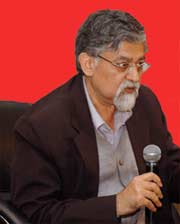Indian economy not prone to deflation: Virmani
07 Mar 2009
Mumbai: India's economic slowdown will continue at least till September, but there is no chance of a deflation, said a top finance ministry official in Mumbai on Friday.
 "I expect inflation by March to be below 3 per cent. This I have been saying since December. What is happening now is not a surprise move at least," Arvind Virmani, chief economic adviser at the finance ministry said at the western region annual meeting of the Confederation of Indian Industry (CII).
"I expect inflation by March to be below 3 per cent. This I have been saying since December. What is happening now is not a surprise move at least," Arvind Virmani, chief economic adviser at the finance ministry said at the western region annual meeting of the Confederation of Indian Industry (CII).
''I don't expect deflation in India.'' Virmani added, saying that the government would have the ''will and the ability'' to return to its fiscal responsibility targets.
Deflation occurs in an economy when the negative inflation prevails for a long period. In the event of deflation, the Reserve Bank will have to enhance money supply and lower rates further.
''GDP (gross domestic product) growth rate for India can be reasonably forecast after the publishing of figures for agricultural output. Also by September 2009, uncertainties in the western and European markets are expected to be fully known after which governmental policies and measures are anticipated to stabilise the economy,'' Virmani said.
The GDP growth in the December quarter plummeted to a six-year low of 5.3 per cent from a year earlier. Inflation, India's most widely watched price measure, fell to a 6 year low of nearly 3 per cent in late February.
Analysts expect India's economy to grow at a six-year low of 7.1 per cent in the FY09, after expanding at or above 9 per cent in the previous three years. The economy is also expected to slow further in FY10.
India's central bank cut its short-term interest rates by 50 basis points this week, saying the country's growth had been hit more than expected by the global financial crisis and downturn.
However, according to Virmani, fiscal deficit will stimulate growth of the Indian economy.
''In the last five years, the Indian economy has moved to high growth phase. Though there is a view that the Indian growth trajectory was led by external trade and foreign capital inflows, it is apparently a product of internal growth with an important role played by exports,'' he added.
Virmani noted that the Indian economy is not highly affected by the financial crisis with India reporting a slowdown as compared to recession reported in other developed nations.
''The global meltdown of the year 2008 is a once-in-75-year phenomenon and in such circumstances, there is need to increase demand and raise fiscal deficit to provide stimulus to the economy. Accelerating government investment in infrastructure is seen as substituting the decrease in private investment,'' Virmani added.
He said the fiscal deficit as predicted by the government, of about five per cent is expected to be revised to six per cent and this will act as an automatic stabiliser for the Indian economy.
Virmani also forecast a growth of 2.5-3 per cent in the agricultural sector.
''After the first and second quarter of 2009-10, growth may be slow, but thereafter there will be improvement in the growth rate'', he said.
In the interim budget last month, the government revised its estimate for the fiscal deficit to 6 per cent of GDP for the 2008-09 financial year, sharply higher than the earlier targeted 2.5 per cent.
Statistics showed on Monday that India's exports slid nearly 16 per cent in January, the steepest drop in over a decade.
The export tumble was another sign that India is beginning to feel the full brunt of the global slump, economists said, and came after figures last week showed the economy growing at its slowest pace in six years.
Merchandise exports plunged 15.9 per cent in January to $12.38 billion from the same month a year earlier, the commerce ministry said, marking the fourth straight monthly decline and the biggest percentage fall since mid-1998.
Imports declined 18.2 per cent to $18.46 billion in January, falling for the first time this fiscal year, data showed. Oil imports plunged 47.5 per cent from a year earlier to $4.46 billion.
The Federation of Indian Exporters Association has forecast 10 million job losses in the export sector to the end of March.
Last Friday, the government reported India's economy expanded by 5.3 per cent in the third quarter to December, down from 8.9 per cent in the same period a year earlier.


















